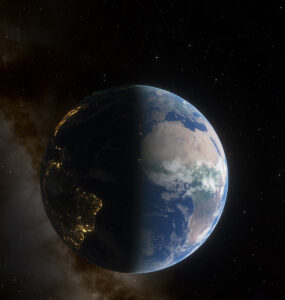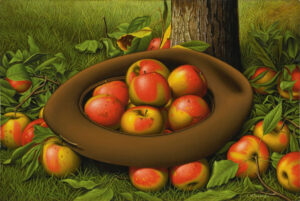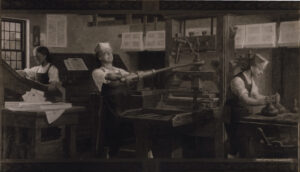I had a whole other chapter written for today’s Convivio Book of Days and this first day of autumn by the almanac, but then my niece, Isabella, and I were chatting (the same niece who had a flying lesson for her 15th birthday in the most recent Convivio Dispatch), about autumn and the equinox and she sent me a link to one of her favorite songs, one that reminds her of autumn. It’s Astor Piazzolla’s “Café 1930,” performed by Alexandra Whittingham and Esther Abrami. She and I wondered what is it, exactly, that can make a collection of sounds epitomize a season. We decided that we didn’t know what it was, but being unable to unlock that particular mystery makes it even better. I listened to her song myself, and she’s right: there is a hint of autumn about it. Then I decided all you need to know about today’s equinox is depicted in the photograph above, showing this old earth at its moment of equinox, which happens to be 3:40 PM here in Lake Worth. That’s Eastern Daylight Time. An equal share of day and night, of light and dark, across the planet: balance. That’s what the equinox is all about. Tomorrow things will begin to shift slightly as the Northern Hemisphere enters its darker half of the year and the Southern its lighter half.
With the academic stuff out of the way, we can listen instead to Isabella’s song of autumn, Astor Piazzolla’s “Café 1930:”
Do you have songs that remind you of autumn? I do, and I’m glad to know that my niece does, too. Feel free to share (please do, actually) your songs in the comments below.
NEW! BIG AUTUMN SALE
It’s looking good for us to return this autumn to the Dia de Los Muertos celebration in Lake Worth and maybe even Fort Lauderdale. But we’re still bringing back the big autumn Street Fair Sale this year!
Now through Day of the Dead (Dia de Los Muertos), use discount code STREETFAIR at checkout for $10 off your purchase of $75 on everything in the shop, and get free domestic shipping, too! What’s new? A big bevy of brand new advent calendars from Germany. Lots of great new hand embroidered tea towels by my mom (Millie’s Tea Towels––Mom’s been embroidering every day!) plus more tea towels hand printed by the folks at Kei & Molly Textiles in New Mexico (as well as eco-friendly reusable cloth bags and compostable sponges, all with fun Kei & Molly prints). And of course lots of great new artesanías méxicanas for Dia de Los Muertos: Day of the Dead. New Christmas goods from Sweden and Germany arriving soon, too. Shop here!
Image: Earth daylight distribution on the September Equinox (Northern Autumn; Southern Spring) as seen on w:SpaceEngine. Creative Commons, 2021, via Wikimedia Commons.


